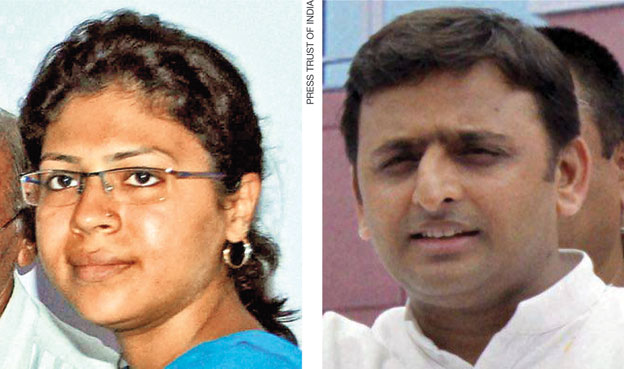Mining in India has got completely sucked into the vortex of bureaucratic, political and business unrest, strife and hassles.
The recent illegal sand mining controversy in Uttar Pradesh erupted when an Indian Administrative Service official (IAS in common parlance), Durga Shakti Nagpal, tried to take on the mighty sand mining mafia that has been ravaging beyond repair and without any approvals, the banks of Yamuna river in Gautam Budh Nagar district.
But instead of finding support in the state government for her actions that are part of her normal duties, she was at the receiving end of the wrath of the state’s political authorities led by chief minister Akhilesh Yadav of the Samajwadi Party.
The officer was slapped with a case of suspension for the demolition of a wall of an under construction mosque.
To rein her in a whole new albeit dangerous twist of conflagrating communal violence in a state was made of her actions, notwithstanding the fact that the state suffers the sad record of witnessing 34 killings linked to communal violence in 2012 alone.
An examination of past apex court judgments shows that the officer had not flouted any law or ruling.
In mid-January a two-judge bench, comprising Justice R.M. Lodha and Justice S.J. Mukhopadhaya of the Supreme Court had empowered government bodies to “prevent unauthorized constructions being carried out under the garb of religious activities as often local political interests and religious sentiments render authorities helpless” and “make no differentiation between a temple or a mosque if it is illegal or unauthorized.”
The political and administrative machinery stood by the mining mafia and land developers, for reason that may be guessed by anyone, and an annoyed Yadav fumed from the state legislative pulpit that they need, “to teach her (Durga) a lesson for her wrong behavior.”
The initial avalanche of criticism and exposure that the state authorities faced from all quarters of political fraternity, citizens, as well as the media, could not shame them enough.
Rather several ministers of the state joined in a chorus, exhibiting their pride and power to get the officer suspended within a matter of 40 minutes of her action which in a way reveals the extent of improper governance that has sunk deep into the state politico-administrative machinery.

(Above): IAS officer Durga Shakti Nagpal (l), who has been suspended over a dispute related to a religious place, by Akhilesh Yadav’s (r) government in Uttar Pradesh.
Political Conundrum. Rare indeed, it is for Sonia Gandhi, heading the Congress, to speak on any issue, and this time she expressed her solidarity with Durga despite being aware that her party’s coalition government at the center enjoys crucial support of Yadav’s Samajwadi Party.
The din and tone of criticism that piled on Yadav’s government finally compelled him to call for a ban on sand mining till adequate environmental clearances had been obtained.
As part of his face saving exercise, he announced registration of a First Information Report and imposition of penalties against the involved apart from setting up of a fresh task force and an e-tendering process.
Putting In Place Experts’ Recommendations. Fact finding missions, especially the latest three-member environment ministry committee reporting to environment minister Jayanthi Natarajan have found widespread violation of approval norms framed by regulatory bodies like State Environment Impact Assessment Authority or the State Pollution Control Board.
Propelled by recommendations of the above committee, the center has endeavored to direct Uttar Pradesh to give form to minor mineral concession rules that adhere to the Mines and Minerals Development Act in a six-month time period and to conduct cumulative impact study of sand mining and cluster approach for collection of baseline data and also limiting mining to three meter depth in river beds and in restricted areas.
One of the accepted suggestions is annual replenishment study by a recognized authority to ascertain quantities of sand being lifted and a complete stop on in-stream mining.
All these recommendations are in line with the February 2012 Apex Court ruling that laid down renewal of mining lease of less than 50 hectares by the SEIAA and an order of the environment ministry that made prior approvals from the National Green Tribunal mandatory for mining activity.
Real Bane & Redressal. Between 2005 and 2011, Uttar Pradesh has suffered a loss of Rs.14 billion due to illegal mining as per a December 2012 draft report of the Comptroller & Auditor General in 21 districts.
The report states that though procedural gaps in legal quarrying, poor control in issuance of approvals, delays in renewal of licenses are the real bane but even when mining was allowed, reserves were blatantly plundered.
A brief analysis of criminal antecedents of legislators from Uttar Pradesh, not any different from other states, explains unabated corruption and criminalization.
About 31 percent of the members of parliament and legislators from this state have criminal cases, rape, murder, attempt to murder, kidnapping, robbery, extortion etc, pending against them in police records as per self-declared affidavits to the Election Commission of India at the time of nomination in various elections.
This explains the zeal amongst most of them to impose an ‘exclusion clause’ for political parties from the ambit of Right to Information law that would help nullify a recent Supreme Court judgment that disqualifies those charged with serious crimes to contest elections.
Former head of India’s top auditing body, Vinod Rai, rues that only administrative reforms and political reforms can salvage the position as bureaucrats are prevented from discharging their duties by “arbitrary and whimsical behavior of a ruling government.”
Lending support to the above suggestion is ex-chief of Central Vigilance Commission N. Vittal, who likens the state’s reaction to a “political vendetta” that needs to be checked by a mechanism entailing review of transfers by vigilance commissions or Lokayuktas.
In addition, if political reforms were to be ushered in and state funding of elections is instituted, a fast redressal of problems can be seen.